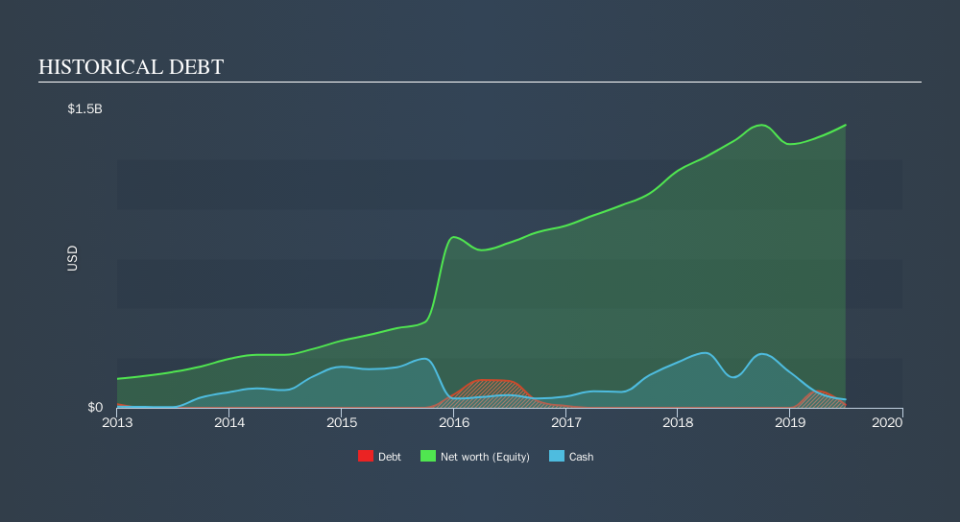We Think Tyler Technologies (NYSE:TYL) Can Stay On Top Of Its Debt

The external fund manager backed by Berkshire Hathaway's Charlie Munger, Li Lu, makes no bones about it when he says 'The biggest investment risk is not the volatility of prices, but whether you will suffer a permanent loss of capital. When we think about how risky a company is, we always like to look at its use of debt, since debt overload can lead to ruin. As with many other companies Tyler Technologies, Inc. (NYSE:TYL) makes use of debt. But the more important question is: how much risk is that debt creating?
When Is Debt Dangerous?
Debt is a tool to help businesses grow, but if a business is incapable of paying off its lenders, then it exists at their mercy. Ultimately, if the company can't fulfill its legal obligations to repay debt, shareholders could walk away with nothing. However, a more frequent (but still costly) occurrence is where a company must issue shares at bargain-basement prices, permanently diluting shareholders, just to shore up its balance sheet. Of course, the upside of debt is that it often represents cheap capital, especially when it replaces dilution in a company with the ability to reinvest at high rates of return. When we think about a company's use of debt, we first look at cash and debt together.
View our latest analysis for Tyler Technologies
How Much Debt Does Tyler Technologies Carry?
You can click the graphic below for the historical numbers, but it shows that as of June 2019 Tyler Technologies had US$15.0m of debt, an increase on none, over one year. But on the other hand it also has US$42.4m in cash, leading to a US$27.4m net cash position.
A Look At Tyler Technologies's Liabilities
Zooming in on the latest balance sheet data, we can see that Tyler Technologies had liabilities of US$453.7m due within 12 months and liabilities of US$74.1m due beyond that. On the other hand, it had cash of US$42.4m and US$381.4m worth of receivables due within a year. So it has liabilities totalling US$104.1m more than its cash and near-term receivables, combined.
Having regard to Tyler Technologies's size, it seems that its liquid assets are well balanced with its total liabilities. So it's very unlikely that the US$10.1b company is short on cash, but still worth keeping an eye on the balance sheet. While it does have liabilities worth noting, Tyler Technologies also has more cash than debt, so we're pretty confident it can manage its debt safely.
On the other hand, Tyler Technologies saw its EBIT drop by 9.4% in the last twelve months. If earnings continue to decline at that rate the company may have increasing difficulty managing its debt load. There's no doubt that we learn most about debt from the balance sheet. But it is future earnings, more than anything, that will determine Tyler Technologies's ability to maintain a healthy balance sheet going forward. So if you want to see what the professionals think, you might find this free report on analyst profit forecasts to be interesting.
Finally, a business needs free cash flow to pay off debt; accounting profits just don't cut it. While Tyler Technologies has net cash on its balance sheet, it's still worth taking a look at its ability to convert earnings before interest and tax (EBIT) to free cash flow, to help us understand how quickly it is building (or eroding) that cash balance. Over the last three years, Tyler Technologies actually produced more free cash flow than EBIT. That sort of strong cash generation warms our hearts like a puppy in a bumblebee suit.
Summing up
While it is always sensible to look at a company's total liabilities, it is very reassuring that Tyler Technologies has US$27.4m in net cash. The cherry on top was that in converted 111% of that EBIT to free cash flow, bringing in US$193m. So we don't think Tyler Technologies's use of debt is risky. We'd be motivated to research the stock further if we found out that Tyler Technologies insiders have bought shares recently. If you would too, then you're in luck, since today we're sharing our list of reported insider transactions for free.
At the end of the day, it's often better to focus on companies that are free from net debt. You can access our special list of such companies (all with a track record of profit growth). It's free.
We aim to bring you long-term focused research analysis driven by fundamental data. Note that our analysis may not factor in the latest price-sensitive company announcements or qualitative material.
If you spot an error that warrants correction, please contact the editor at editorial-team@simplywallst.com. This article by Simply Wall St is general in nature. It does not constitute a recommendation to buy or sell any stock, and does not take account of your objectives, or your financial situation. Simply Wall St has no position in the stocks mentioned. Thank you for reading.

 Yahoo Finance
Yahoo Finance 
